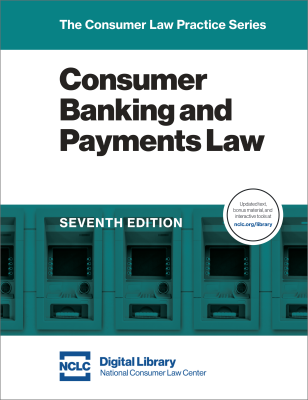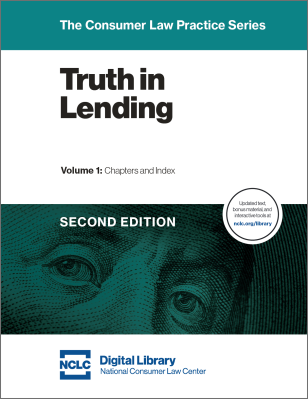Effective Date of Regulation E and Regulation Z Amendments
Effective April 1, 2019, the CFPB’s Prepaid Accounts Rule goes into effect, amending the Electronic Fund Transfers Act’s (EFTA) Regulation E and Truth in Lending Act’s (TILA) Regulation Z. (Merchants may continue to sell noncompliant card stock manufactured before the effective date and certain rule provisions have a later effective date. See NCLC’s Consumer Banking and Payments Law § 7.2.3.1.2.) By putting many prepaid accounts within the scope of the EFTA and prepaid cards with a credit or overdraft feature within the scope of TILA, the new rule provides potent consumer remedies for rule violations.
Consumer Concerns with Growing Utilization of Prepaid Accounts
Prepaid services are among the fastest-growing segment of the financial payments industry. According to Mercator Advisory Group, the market is growing at an annual rate of around 10% and is expected to reach $428 billion in 2021. Roughly 6 million employees receive wages on payroll cards; millions of individuals receive federal and state government benefits through prepaid cards; many consumers use prepaid cards as an alternative to debit cards and bank accounts; and many students receive their student aid through cards used on campus. There are a myriad of other uses for prepaid accounts such as inmate release prepaid cards.
Prepaid accounts are offered by many vendors, including American Express, Green Dot, NetSpend, Vanilla, the payroll processor ADP, and many banks and credit unions. Most prepaid accounts that will be covered by the rule are branded by networks such as Visa, MasterCard or American Express, but not all are. Person-to-person payment systems such as PayPal, Venmo, and Square also hold funds in prepaid accounts.
Significant consumer issues have arisen with prepaid accounts, including hidden fees, overdraft fees, and unclear legal protections and remedies for lost or stolen cards, unauthorized charges, and errors. Consumers have sometimes been unlawfully required to receive funds such as wages, non-needs-tested government benefits, or student aid on prepaid cards. Some prepaid accounts lack FDIC insurance payable to the consumer even if the funds are ultimately held at a bank.
The CFPB Prepaid Accounts Rule offers a series of protections to address these issues. Violations lead to private remedies under EFTA and TILA (if the violation involves a credit feature). The rule and other protections governing prepaid accounts are examined in detail at NCLC’s Consumer Banking and Payments Law Chapter 7.
Accounts Covered by the CFPB Prepaid Accounts Rule
The Prepaid Accounts Rule applies to four categories of prepaid accounts:
(A) Payroll card accounts directly or indirectly established through an employer and to which wages, salary, or other employee compensation (such as commissions) are made on a recurring basis, whether the account is operated or managed by the employer, a third-party payroll processor, a depository institution, or any other person. (12 C.F.R. § 1005.2(b)(3)(i)(A).
(B) Government benefit accounts used by the federal government for Social Security, SSI, veterans benefits and other benefits, and also cards used by state or local agencies to distribute non-needs-tested benefits such as unemployment insurance or child support. The rule does not apply to cards used by states or local governments to distribute needs-tested benefits such as SNAP, TANF, WIC or general assistance.
(C) Accounts labeled or marketed as “prepaid” and usable at unaffiliated merchants or at ATMs.
(D) Accounts, other than checking accounts, whose primary function is to conduct transactions with multiple unaffiliated merchants, at ATMs, or for person-to-person transfers.
See 12 C.F.R. § 1005.2(b)(3)(i); NCLC’s Consumer Banking and Payment Law §§ 7.2.3.2, 7.3.
To fall into the last two categories (C) and (D), the accounts must be accessible at unaffiliated merchants (i.e., in the way a Visa card is broadly usable). The rule does not apply to: closed-loop cards such as gift cards usable only at a particular store or group of stores; a college stored value card limited to campus venues; or a transit card usable only on the transit system. However, many of these closed-loop cards or accounts are covered by the EFTA’s gift card provisions. See NCLC’s Consumer Banking and Payment Law § 7.7.
The CFPB Prepaid Accounts Rule applies not only to accounts that have physical cards, but also to accounts such as Venmo and PayPal that hold funds which are accessible through other types of access devices such as mobile devices or account numbers usable on the internet.
Rule Exclusions
Unless it is a payroll card or government benefit account, or is labeled and marketed as “prepaid,” an account is not a prepaid account if it is a “checking account, share draft account, or negotiable order of withdrawal account.” 12 C.F.R. § 1005.2(b)(3)(i)(D). These terms are not defined in the rule, but the CFPB has stated that the mere fact that an account provides the capability to issue preauthorized checks does not make it a checking account. 81 Fed. Reg. 83,934, 83,974 (Nov. 22. 2016). On the other hand, the CFPB’s Small Entity Compliance Guide—which is not a part of the rule itself—states checkless checking accounts are not covered. A checkless checking account is a safe bank account without nonsufficient funds or overdraft fees that is offered directly by banks at bank branches with full Regulation E protections. See FDIC Model Safe Accounts Template and also Cities for Financial Empowerment Fund, Bank On National Account Standards.
Nonetheless, advocates should look out for accounts such as the ACE Flare Account and NetSpend All-Access account that have overdraft fees and may purport to be “checking accounts” not covered by the rule. Though these accounts may use a bank identification number (BIN) associated with an individual deposit account rather than a prepaid account, to the consumer these cards are indistinguishable from other prepaid cards and there is nothing about them that justifies a claim that they are checking accounts.
There are several exclusions from the prepaid accounts covered in prongs (C) and (D) of the definition, but the exclusions do not apply to payroll card or government benefit accounts:
- Health savings, flexible spending, medical savings, health reimbursement, dependent care, transit, or parking reimbursement accounts;
- Accounts established through a third party and loaded only with qualified disaster relief payments;
- Accounts used primarily on military bases, ships, and similar government facilities.
See 12 C.F.R. § 1005.2(b)(3)(ii). For more on the scope of the Prepaid Accounts Rule, see NCLC’s Consumer Banking and Payment Law § 7.2.3.2.
Prepaid Accounts Rule Protections
The CFPB Prepaid Accounts Rule brings prepaid accounts within the protections of Regulation E that apply to bank accounts and debit cards. The rule also adopts a number of provisions that are specific to prepaid accounts.
The following protections apply to all electronic fund transfers covered by Regulation E, though there are some modifications for prepaid accounts:
- Protection against unauthorized charges and errors. Once the consumer registers the account in the consumer’s name, the consumer has liability protection and may invoke error resolution provisions. Deadlines to dispute charges or errors are modified if the consumer does not receive statements. In general, to receive maximum protection, consumers must make a report:
- Within two business days of learning of a lost or stolen card or access device; or
- If the card or access device was not lost or stolen, within 120 days of an unauthorized charge (or within 60 days of being sent a statement, if the consumer receives statements, or of accessing the account electronically).
- See NCLC’s Consumer Banking and Payment Law §§ 7.2.3.8, 7.2.3.9.
- Choice for employees and government benefits recipients. Employers and government agencies cannot require consumers to receive wages or benefits through a particular prepaid or other account. Employees and government benefits recipients must be given fee information for the card and at least one other choice, such as direct deposit to a checking or prepaid account of their choice. Whether employers must offer the choice of a paper paycheck is determined by state law. Id. §§ 7.2.3.4.4, 7.2.3.4.6, 7.3.1, 7.4.2.2.
Additional protections apply only to prepaid accounts, not other accounts covered by Regulation E:
- Clear, uniform fee charts. A short chart of key fees will be on the outside of the package for cards sold at retail and provided online before purchase. More details will be on a longer chart inside the package and online at the URL provided on the package. Id. § 7.2.3.4.
- A warning if funds are not FDIC insured. But most prepaid accounts have FDIC insurance once they are registered. Id. §§ 7.2.3.4.4, 7.2.3.4.6.
- Basic account information for free. If the account issuer does not provide statements, it must provide account balances by telephone, transaction information online, and ad hoc transaction histories by mail up to once per month on request without charge. Id. § 7.2.3.7. Issuers may charge for regular monthly paper statements. For government benefit accounts only, balance information must be available for free at a terminal (i.e., an ATM). Id. §§ 7.2.3.7, 7.4.2.3.
- Public and consumer access to account agreements and fee schedules. Prepaid account issuers, including issuers of payroll and government benefits accounts, must submit their account agreements annually to the CFPB. Companies that offer cards to the general public must post fee information on a publicly accessible part of their website. All prepaid account issuers must also provide a copy of the consumer’s prepaid account agreement within five business days upon request unless the agreement is available online either in the public portion of the website or the portion accessible after logging in. Id. § 7.2.3.3.
The CFPB Prepaid Accounts Rule also brings prepaid accounts that have a credit feature within the scope of TILA and Regulation Z, and adds several provisions particular to prepaid accounts:
- Accounts that offer overdraft features must disclose that fact on the package and wait 30 days before offering overdraft coverage. These hybrid prepaid credit cards must comply with credit card and “fee harvester” rules, including a requirement to determine the ability to repay, to limit the total of overdraft fees in the first year to no more than 25% of the credit line extended, and to give the consumer a choice of whether to permit automatic repayment. The Regulation E overdraft services opt-in rules that apply to bank account debit cards and exempt them from Regulation Z do not apply to prepaid accounts. Id. § 7.2.4.
Private Remedies for Violations of the CFPB Prepaid Accounts Rule
Violations of Regulation E or Regulation Z—including the special provisions related to prepaid accounts—lead to EFTA or TILA remedies, respectively.
Any person who fails to comply with the EFTA is liable for actual damages, statutory damages not less than $100 nor greater than $1000 (in a class action the maximum is the lesser of $500,000 or 1% of the defendant’s net worth), and costs and reasonable attorney fees. See 15 U.S.C. § 1693m. Certain violations relating to error resolutions can also lead to treble damages. See 15 U.S.C. § 1693f(e). For more on when these remedies are triggered, possible defenses, the applicable statute of limitations, and other issues related to EFTA remedies, see NCLC’s Consumer Banking and Payment Law § 5.17.
Violations of either the existing or the new Regulation Z provisions lead to TILA remedies, including actual damages, costs, and attorney fees. 15 U.S.C. § 1640(a). Certain violations lead to statutory damages between $500 and $5,000, or to such higher amount as may be appropriate in the case of an established pattern or practice of noncompliance. 15 U.S.C. § 1640(a)(2)(A)(iii). See NCLC’s Truth in Lending for a discussion of TILA remedies.
For example, if NetSpend’s ACE Flare Account (advertising “Optional Debit Card Overdraft Service” with $15 overdraft fees) and All-Access card, discussed above, are found to be prepaid accounts that are violating the overdraft fee provisions of the rule, NetSpend could be liable for EFTA and TILA damages and attorney fees.
Additional Resources on Prepaid Accounts Rule
NCLC’s Consumer Banking and Payments Law §§ 7.2.3, 7.2.4
NCLC, New Protections for Prepaid Card Accounts
NCLC, New Protections for Payroll Cards
NCLC, New Protections for Government Benefit Prepaid Cards
Consumer Fin. Prot. Bureau, Prepaid Rule, Small Entity Compliance Guide (Mar. 2018)
Consumer Fin. Prot. Bureau, Executive Summary of the Prepaid Rule (Oct. 5, 2016)
Consumer Fin. Prot. Bureau, Prepaid Rule’s Key Changes for Payroll Card Accounts (Jan. 25, 2018)
Consumer Fin. Prot. Bureau, Prepaid Rule’s Key Changes for Government Benefit Accounts (Jan. 25, 2018)
Consumer Fin. Prot. Bureau, Model and Sample Pre-Acquisition Disclosure Forms for Prepaid Accounts
Caution: some of the above CFPB material was published before the CFPB made additional amendments to the rule, as described in NCLC’s Consumer Banking and Payments Law §§ 7.2.3 and 7.2.4.
Other Regulation of Prepaid Cards
Many colleges and universities use prepaid cards to distribute financial aid and other funds or to pay for certain items on campus. The cards are often combined with the student identification card and may access more than one type of account. Schools also may have arrangements with financial institutions that can include co-branding, joint marketing, campus access, and branches on campus.
The U.S. Department of Education has adopted rules governing certain bank account and prepaid card programs offered in connection with institutions of higher education. 34 C.F.R. § 668.164. The rules are aimed at: making sure that students have a choice of where to receive their financial aid dollars; protecting them from onerous fees on accounts that are marketed through colleges and universities; and enhancing transparency of the arrangements between schools and financial institutions. See NCLC’s Consumer Banking and Payments Law § 7.5.1.
Payroll cards are also governed by the Fair Labor Standards Act, 29 U.S.C. § 206(a), so that fees related to the card cannot bring the amount the employee receives under the minimum wage. Id. § 7.3.5. State law may also regulate payroll cards. Id. § 7.3.6.
U.S. Department of Labor has issued guidance to the states as to best practices concerning payment of unemployment insurance by prepaid card. See Id. § 7.4.3. State law may also limit fees and other practices concerning cards used for government payments. See Id. § 7.4.5.
Certain gift cards are not regulated by the new CFPB rule. Their regulation often involves a complex interrelation of state and federal law, as explained in more detail at id. § 7.7.



